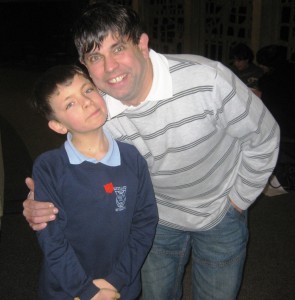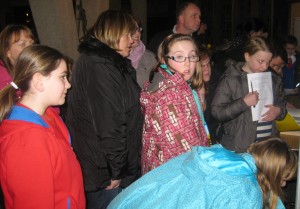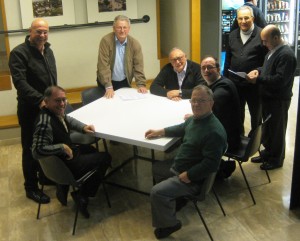Father, It Must Be Hard to Work as a Priest in Today’s World?
Posted by Fr. JonathanFeb 23
Last week Socius wrote a blog entitled “The Place for Prayers is in Church”. It was connected with the theme of atheism in modern Britain, and was closely argued to show that a position of belief in God was more sensible than that of believing there is no God. As somebody once observed: you have to have faith to be an atheist! It is most interesting that, in the history of the world, atheism has not been at all widespread. Even today it is not widespread outside of Europe, but among our fellow Europeans it is developed, and the atheists, at least in Britain, are gaining the higher moral ground.
 |
Father and Son at Leyland Confirmation Preparation
As a priest in a parish, people sometimes say to me: “Father it must be hard to work as a priest in today’s world!” It is interesting that ‘practical atheism’ is widespread. In practice, people who believe, largely do not put their faith into action, by worshipping God on Sundays. In practice, we are surrounded by many who do not live by the norms of Christian belief, in regards to moral behaviour in business, in relationships, in fidelity in marriage, in the sanctity of life in the womb and, increasingly, in the sanctity of life in terminal illness. In practice, the Churches are largely in decline, and, those who do believe, can be publicly ridiculed by the media. In practice, once good practising Catholics, are no longer to be considered as such. In practice, it is very difficult to find young people who are a part of the community of faith and, so it might go on.
 |
Trying to find names of saints for girls – Leyland St. Mary’s Confirmation Programme
I think it would be difficult to live as a priest today, if I had not found that, in all the above circumstances, God’s light shines on me and guides my steps, and his fire still burns in my heart, above all, through an increasing love of the Word of God; that is a massive support mechanism. On my own – left to my own devices – it would be impossible to live as a priest today!
Evidence is important in all this. We can find evidence for God’s existence; it is evidence, of course, that drives science forward, as experiments are undertaken to demonstrate what the scientist is out to prove. It drives belief, too. It is evidence, accrued from personal experience that interests me, at this moment, though there are other types of evidence, of course, for God’s existence.
This train of thought has been growing in my heart, both from my experience, and from a phrase underlined by Archbishop Patrick Kelly, (our Bishop in the Diocese of Liverpool), referring to Pope Benedict XVI’s Encyclical “Deus Caritas Est”. “Being Christian is not the result of an ethical choice or a lofty idea, but the encounter with an event, a person.”
 |
Archbishop Patrick (2nd from left) with the Apostolic Nuncio and two monks at Leyland St. Mary’s
The Word of God is an event in some, if not all, lives. Ultimately, the Word of God is a person – the ‘WORD BECAME FLESH AND LIVED AMONG US’; we Christians know that this person is not dead, but alive, and we can have a personal relationship with the ‘Word of God’ because he became Flesh, and rose again. The ‘Word of God’ changes things, and although, of course, Christians live by faith, I as a Christian, can say as somebody who tries to live by God’s Word, and tries to do his will, that I know Jesus, who is the ‘Word of God’. I know him because he changes things, and gives me ‘light’ with which to live and, also, a ‘fire’ burning inside – not the fire of human love – but close to it. “Were not our hearts burning within us as he talked to us on the road, while he was opening the scriptures to us?” (Luke 24:32), commented those two disciples when Jesus appeared to them, in the breaking of bread, at Emmaus. Those two disciples did not ‘know’ God, in the sense of understanding him – and his infinite power, knowledge, love and mercy – but their hearts burned within them, at the events they experienced.
 |
Jesus breaks bread at Emmaus
I would like to wager that many people have had experiences that are similar, both those who are ‘Churchy’ people, and those who are not. Many people have been deeply, and personally, touched by events – experiences – they have shared. It may have been a funeral; it may have been something seen on the internet, or on TV, or it may be a neighbour they know, who has given inspiration. The Emmaus pair knew they had found the ‘pearl of great price’ for which they would sell everything. The same sense has also been mine, and it is for that reason that my life as a monk, and as a priest, is so good.
The ‘Word of God’, in the scriptures, betrays no doubts about the existence of God. Praying the Psalm at Morning Prayer, today, brought into my heart a wealth of ideas, and reflections, about my own experience.
We heard with our own ears, O God, our Fathers have told us the story
of the things you did in their days, you yourself, in days long ago. (Psalm 43 (44))
I am fully aware of what God has done in the lives and events of so many people connected with me – in the way love and mutual respect have grown, where there was little before – when there was little self-respect and it has grown into Godly self-esteem – where sins have been forgiven, and people have found that inner freedom and joy.
..it was not in my bow that I trusted nor yet was I saved by my sword:
It was you saved us from our foes, it was you who put our foes to shame.
All day long our boast was in God and we praised your name without ceasing. (Psalm 43 (44))
I am also fully aware that any good that is done by me, or anyone else in the world, is the work of God himself and not my work. The task of the Christian is to abide in God and let him work his wonders; the abiding is our work that is actually also God’s grace!
Sadly, the ‘Word of God’, in the scriptures, is ignored by the majority; however, it comes to life when the life of God, that is the ‘Word’, produces its effects. The most important effect, to focus on for this short blog, is that it produces a community of people, who are all bound together, by the ‘Word’, into union with one another, in God. Jesus himself realised this, for in St. John’s Gospel, we read “By this everyone will know that you are my disciples, if you have love for one another.” (John 13:35) The ‘Word’ creates a communion of people that cares for each other, and serves others outside the group. People take note that, in this kind of community, there is something special. Sometimes they refer to that ‘peace’, for which outsiders yearn.
 |
Religious Men of different Religious Orders at a recent meeting
It is the support-mechanism, we give to each other, that is essential; this is very much so for me, personally, and it evokes a different image of ‘Church’. Nobody is an isolated individual but as Cardinal Newman spoke, ‘a link in a chain’. ‘Church’ is not just a system, a set of rituals, a structure; essentially, it is a communion of loving people, who belong to each other, respect each other and where Jesus the ‘Word of God’ is alive within’ and among them. All the ritual, structures, and systems come after that, though they are necessary, in their own way – they have a part to play. Church is a communion of people where one learns not to look down on anyone – even if their beliefs are utterly different to one’s own. The support-mechanisms, themselves, have their own systems, rituals and structures, in a loose way, but it is the life-events, where God is present, that is most helpful, and, even if some of those ‘supports’ give way, it does not negate the fact that the ‘support’ is the life-saver; more than that, it is, itself, the presence of the ‘Word of God’ surrounding me, not just as in a book of words that is the Scripture, but as a presence of a person, who is divine, and who I know, and try to love.
No, it is not hard for me to live as a priest in today’s world, atheistic though it may be. It would be nice sometimes, not to be quite so busy though!
When sending out the Blog by email the formatting will be largely dislocated. To view it in its original form, please visit the main website.

No comments